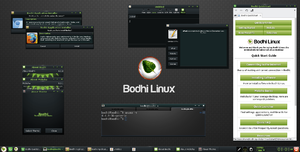
A Linux distribution is an operating system made from a software collection that includes the Linux kernel and often a package management system. Linux users usually obtain their operating system by downloading one of the Linux distributions, which are available for a wide variety of systems ranging from embedded devices and personal computers to powerful supercomputers.

PCLinuxOS, often shortened to PCLOS, is a rolling release Linux distribution for x86-64 computers, with KDE Plasma, MATE, and XFCE as its default user interfaces. It is a primarily FOSS operating system for personal computers aimed at ease of use.
Puppy Linux is an operating system and family of light-weight Linux distributions that focus on ease of use and minimal memory footprint. The entire system can be run from random-access memory (RAM) with current versions generally taking up about 600 MB (64-bit), 300 MB (32-bit), allowing the boot medium to be removed after the operating system has started. Applications such as AbiWord, Gnumeric and MPlayer are included, along with a choice of lightweight web browsers and a utility for downloading other packages. The distribution was originally developed by Barry Kauler and other members of the community, until Kauler retired in 2013. The tool Woof can build a Puppy Linux distribution from the binary packages of other Linux distributions.

Kubuntu is an official flavor of the Ubuntu operating system that uses the KDE Plasma Desktop instead of the GNOME desktop environment. As part of the Ubuntu project, Kubuntu uses the same underlying systems. Kubuntu shares the same repositories as Ubuntu and is released regularly on the same schedule as Ubuntu.

Pardus is a Linux distribution developed with support from the government of Turkey. Pardus' main focus is office-related work including use in Turkish government agencies. Despite that, Pardus ships in several languages. Its ease of use and availability free of charge has spawned numerous communities throughout the world.

Xubuntu is a Canonical Ltd.–recognized, community-maintained derivative of the Ubuntu operating system. The name Xubuntu is a portmanteau of Xfce and Ubuntu, as it uses the Xfce desktop environment, instead of Ubuntu's customized GNOME desktop.
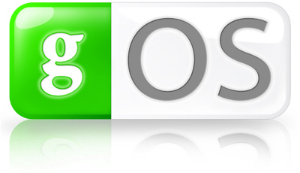
gOS or "good OS" was an Ubuntu-based Linux distribution created by Good OS LLC, a Los Angeles-based corporation. Its CIO David Liu described that after meeting Enlightenment and open source people, he realized that his dream to bring Web 2.0 applications into mainstream use could be achieved by creating a Linux distribution that made it easy for users to access Google and Web 2.0 applications. David Liu went on to create the Chinese Twitter clone called Wozai (我在), leaving gOS officially defunct.

OpenGEU was a free computer operating system based upon the popular Ubuntu Linux distribution, which in turn is based on Debian. OpenGEU combined the strengths and ease of use of GNOME desktop environment with the lightweight, and graphical eye candy features of the Enlightenment window manager into a unique and user-friendly desktop. While OpenGEU was originally derived from Ubuntu, the design of the user gave it a significantly different appearance to the user, with original art themes, software and tools.

Midori is a free and open-source web browser. In 2019, the Midori project was acquired by the Astian Foundation. After the acquisition, the project became a derivative of the Firefox browser.

Tiny Core Linux (TCL) is a minimal Linux kernel based operating system focusing on providing a base system using BusyBox and FLTK. It was developed by Robert Shingledecker, who was previously the lead developer of Damn Small Linux. The distribution is notable for its small size and minimalism; additional functions are provided by extensions. Tiny Core Linux is free and open-source software licensed under the GNU General Public License version 2.

Lubuntu is a lightweight Linux distribution based on Ubuntu that uses the LXQt desktop environment in place of GNOME. Lubuntu was originally touted as being "lighter, less resource hungry and more energy-efficient", but now aims to be "a functional yet modular distribution focused on getting out of the way and letting users use their computer".
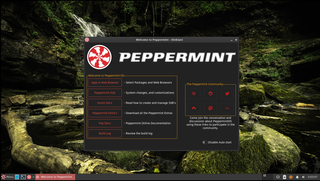
Peppermint OS is a Linux distribution based on Debian and Devuan Stable, and formerly based on Ubuntu. It uses the Xfce desktop environment. It aims to provide a familiar environment for newcomers to Linux, which requires relatively low hardware resources to run.

Pinguy OS was a Linux distribution for x86-based PCs, based on Ubuntu, that featured a modified GNOME desktop environment designed for enhanced user-friendliness. It has been discontinued.

The Trinity Desktop Environment (TDE) is a complete software desktop environment designed for Linux and Unix-like operating systems, intended for computer users preferring a traditional desktop model, and is free/libre software. Born as a fork of KDE 3.5 in 2010, it was originally created by Timothy Pearson, who had coordinated Kubuntu remixes featuring KDE 3.5 after Kubuntu switched to KDE Plasma 4.
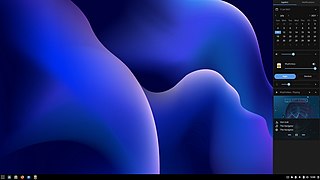
Solus is an independently developed operating system for the x86-64 architecture based on the Linux kernel and a choice of Budgie, GNOME, MATE or KDE Plasma as the desktop environment. Its package manager, eopkg, is based on the PiSi package management system from Pardus Linux, and it has a semi-rolling release model, with new package updates landing in the stable repository every Friday. The developers of Solus have stated that Solus was intended exclusively for use on personal computers and will not include software that is only useful in enterprise or server environments.

elementary OS is a Linux distribution based on Ubuntu LTS. It promotes itself as a "thoughtful, capable, and ethical" replacement to macOS and Windows and has a pay-what-you-want model. The operating system, the desktop environment, and accompanying applications are developed and maintained by elementary, Inc.

Raspberry Pi OS is a Unix-like operating system based on the Debian GNU/Linux distribution for the Raspberry Pi family of compact single-board computers. First developed independently in 2012, it has been produced as the primary operating system for these boards since 2013, distributed by the Raspberry Pi Foundation.

SparkyLinux is a desktop-oriented operating system based on the Debian operating system. The project offers a ready to use operating system with various desktops to choose from. SparkyLinux is released 3-4 times per year to provide the latest versions of all applications.

Ubuntu Budgie is an official community flavor of Ubuntu. It combines the Ubuntu-based system with the independently developed Budgie desktop environment.
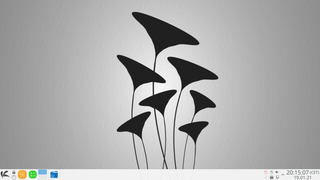
KaOS is a desktop Linux distribution that features the latest version of the KDE desktop environment, the LibreOffice office suite, and other popular software applications that use the Qt toolkit.
